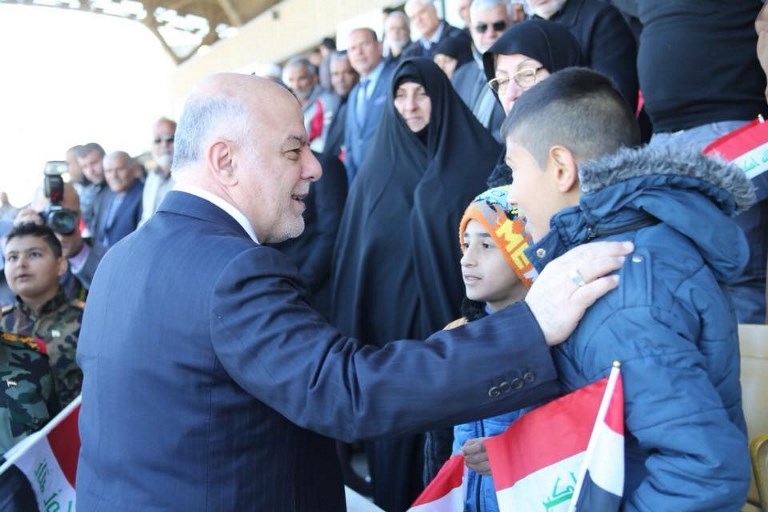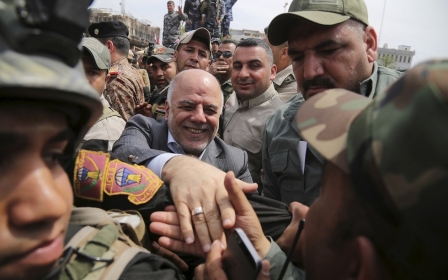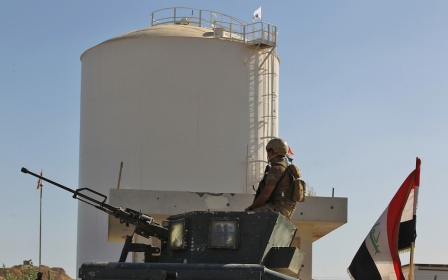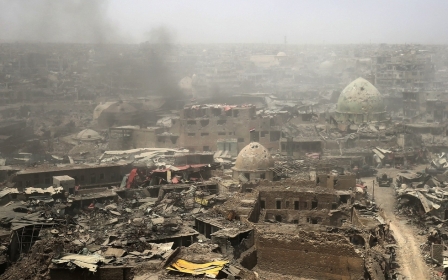Iraqi PM Abadi to seek re-election in alliance with Iran-backed group

Iraqi Prime Minister Haider al-Abadi on Sunday announced he would stand for re-election on 12 May at the head of a cross-sectarian bloc, and received the support of a powerful Shia group close to Iran.
Abadi, a Shia Muslim who led Iraq in the three-year war against the militant group Islamic State (IS), said the "Victory Alliance" that he was assembling to contest the parliamentary election would include candidates from other communities.
Abadi took over the premiership in 2014 from Nuri al-Maliki, a close ally of Iran widely blamed by Iraqi politicians for the army's collapse as IS seized a third of Iraq.
Maliki, who heads the Shia Dawa party, announced on Saturday that he would be running in the election.
Maliki, who holds the ceremonial title of vice-president, remains a powerful figure as head of the largest political bloc in the current parliament.
Abadi is a Dawa member but did not secure Maliki's endorsement for his candidacy. Maliki said on Saturday that Dawa supporters would be free to choose between his "State of Law" alliance and Abadi's Victory Alliance.
The prime minister did, however, secure the support of the powerful coalition of Iranian-backed Shia groups who took part in the war on IS, led by the Badr Organisation.
Defeating Islamic State
Lawmakers close to Abadi and Badr leader Hadi al-Amiri told Reuters their representatives had signed an electoral pact on Sunday.
Abadi is credited with quickly rebuilding the army and defeating IS in its main Iraqi stronghold, Mosul, last July, with strong assistance from a US-led coalition.
His tie-up with Amiri's "Conquest Alliance" broadens his base within Iraq's majority Shia Arab community.
But it alienated Moqtada al-Sadr, an influential Shia cleric with a large following among Iraq's urban poor who two years ago led demonstrations against the corruption eating away at Iraq's oil revenues.
"I am stunned to see the course taken by brother Abadi, who we had thought to be a leading advocate of reform," said a statement from Sadr, one of a few Iraqi Shia leaders who keep Iran at arm's length.
The prime minister's office is reserved for the Shia Arabs under a power-sharing system set up after the 2003 US-led invasion that toppled Saddam Hussein, a Sunni Arab.
The largely ceremonial office of president is reserved for a Kurdish member of parliament. The speaker of parliament is drawn from Sunni Arab MPs.
Parliament is likely to meet in the next few days to approve 12 May as the date for the election.
New MEE newsletter: Jerusalem Dispatch
Sign up to get the latest insights and analysis on Israel-Palestine, alongside Turkey Unpacked and other MEE newsletters
Middle East Eye delivers independent and unrivalled coverage and analysis of the Middle East, North Africa and beyond. To learn more about republishing this content and the associated fees, please fill out this form. More about MEE can be found here.




